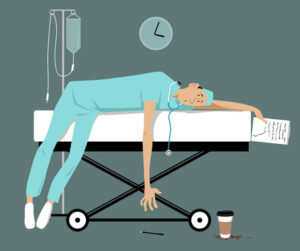Leaders and employees alike are constantly burdened with the task to be creative and innovative at the workplace. Today, the rapid advancement of technology has fuelled a high pace of change in almost all industries. The pressure has created an overwhelming demand for new ideas on a frequent basis although it is massively felt in some industries more than others. Whereas there are many benefits to having this rapid advancement, one of the major disadvantages has been regular burnout and mental fatigue in people at work.
Jude Jennison in a leadership piece further details how fast-paced change and increasing amounts of information create overwhelm, a jumbled mind and “head spin” where people grasp for the answers and information amongst a plethora of data. Some cope with this by tuning out external distractions, focusing on their own needs and disconnecting from those around them.
There has been little to no provision of support as the sudden occurrence of the COVID-19 pandemic has forced a heavier reliance on technology, creating a wider gap in social interactions and connections. Jennifer Riggings, a contributor to NewStack writes: “Over the last year there has been little management training to learn how to support remote employees. This has many managers defaulting to old school, top–down, prescriptive management and even more meetings.
Not only did managers need training, but first–time remote workers did too. The most that happened was some tool training. Or perhaps an all–hands webinar or eBook by HR.” She continues: “Nobody has learned to turn off. We filled that time we got back from not commuting – even if we only worked from home before – with more work. On average, we’re working four more hours a week – more meetings and points of connection. We’re sending more emails, with an 8% increase in sending outside business hours.
 Findings link mental burnout to the overuse of technology. Online connectivity is great for many things (i.e. keeping teams informed and efficient), but it creates a dysfunctional work outlook. Hamza Khan, multi-award winning marketer, and global keynote speaker explains that being this connected means we feel obligated to always be on. He further reiterated that emails come in that are difficult to ignore, especially if it’s from our boss. Therefore, employees are constantly working even when they leave their office for the day. This sort of lifestyle takes its toll.
Findings link mental burnout to the overuse of technology. Online connectivity is great for many things (i.e. keeping teams informed and efficient), but it creates a dysfunctional work outlook. Hamza Khan, multi-award winning marketer, and global keynote speaker explains that being this connected means we feel obligated to always be on. He further reiterated that emails come in that are difficult to ignore, especially if it’s from our boss. Therefore, employees are constantly working even when they leave their office for the day. This sort of lifestyle takes its toll.
In 2019, the World Health Organization recognized workplace burnout as a genuine “occupational phenomenon”. WHO defined it as a syndrome arising from “chronic workplace stress that has not been successfully managed.” However, it’s difficult to manage stress if you’re swimming in work during your so-called downtime. When you’re constantly on (even outside of the office) that means there is no off switch. It feels like you have no opportunity to pause and take a deep breath without worrying about the next task. That can lead to bigger health issues and, more likely, burnout.
A recent report from Indeed found that employee burnout is on the rise: 52% of all workers are feeling burned out, up +9% from a pre-COVID survey. Employees of all ages and types are experiencing the impact of stress, fatigue, and mental health challenges.
The impact keeps increasing and the following statistics create a fuller picture of how dire the situation is:
- 75% of workers have experienced burnout, with 40% saying they’ve experienced burnout specifically during the pandemic. (FlexJobs)
- 67% of all workers believe burnout has worsened over the course of the pandemic. (Indeed)
- Burned–out employees are 63% more likely to take a sick day and 2.6 times as likely to be actively seeking a different job. (Gallup)
- 37% of employed respondents say they are currently working longer hours than usual since the pandemic started. (FlexJobs)
- 61% percent of remote workers and 53% of on–site workers now find it more difficult to “unplug” from work during off–hours. (Indeed)
So far, we have talked extensively about how technology has contributed to increased burnout. However, there are additional factors that contribute to this. MayoClinic lists them as follows:
- Lack of control. An inability to influence decisions that affect your job – such as your schedule, assignments or workload – could lead to job burnout. So could a lack of the resources you need to do your work.
- Unclear job expectations. If you’re unclear about the degree of authority you have or what your supervisor or others expect from you, you’re not likely to feel comfortable at work.
- Dysfunctional workplace dynamics. Perhaps you work with an office bully, or you feel undermined by colleagues or your boss micromanages your work. This can contribute to job stress.
- Extremes of activity. When a job is monotonous or chaotic, you need constant energy to remain focused – which can lead to fatigue and job burnout.
- Lack of social support. If you feel isolated at work and in your personal life, you might feel more stressed.
- Work-life imbalance. If your work takes up so much of your time and effort that you don’t have the energy to spend time with your family and friends, you might burn out quickly.
Amidst the countless challenges, employees and managers at work are expected to churn out innovative ideas as quickly as the hand of a clock moves. That is an impossible task because there is a high likelihood of always feeling overwhelmed. Even if you have a lot of ideas, you may be overwhelmed by the number of things you have to think through such that you never get started.
Aside the reduced performance, VeryWellMind mentions the following as common signs of burnout.
- Individuals experiencing burnout view their jobs as increasingly stressful and frustrating. They may grow cynical about their working conditions and the people they work with. They may also emotionally distance themselves and begin to feel numb about their work.
- Physical symptoms: Chronic stress may lead to physical symptoms, like headaches and stomach aches or intestinal issues.
- Emotional exhaustion: Burnout causes people to feel drained, unable to cope, and tired. They often lack the energy to get their work done.

We may not be able to slow down the whole world, but we can, with these 4 keys start our journeys of being more mindful and easier going with ourselves so that we can be responsibly creative.
- Be Human
We often forget that we are living breathing beings. Being surrounded by automation has the tendency to cause us to act like the robots with the people we work with. Yet, we owe it to ourselves to slow down and simply be human. Allow yourself to feel tiredness and overwhelm without immediately going into fix or solution mood. It is not only normal but also very important to relax if need be.
- Be Mindful
The act of being mindful can be very concentrated but there are little habits that you can build that will bring you into the present to observe what is happening around you. It can be taking the time to share your thoughts, feelings and ideas with work colleagues, friends or family or simply writing them down in a book.
When you become aware of what your mind is thinking, you can successfully declutter and discard unhelpful thoughts while focusing on the meaningful and helpful ones. If we make no time to think about the things we think about, or to talk to ourselves, then we get lost in the endless cycle of just doing or acting without true meaning.
- Be Playful
‘All work and no play make Jack a dull boy’ is certainly true! As working adults, we think that there is no reason and space to play. Playing should not be an activity reserved only for children. Everyone can play. Everyone should make some time to play. This simply means that you should take a break! When you pay attention to your mind and your body, you can decipher when it is time to break and refresh. Learn to play without technology. There is so much beauty in the nature around us that it is helpful to reconnect with ourselves and the things we love by doing the simple things such as taking a walk in the park or exercising on the beach.
- Be Restful
Due to technology, information circulates all around us endlessly. It allows an immeasurable amount of noise and news that overwhelms us almost all of the time. But we need to be disciplined enough to disconnect ourselves from all that noise and rest. By nature, we have been wired to recharge and reset our minds and body through rest.
We must therefore be conscious of ourselves in fulfilling our duties not to go beyond our limits and try to fix everything or do every task before us even when we realize tiredness has set in. There is always a notable difference in productivity when it comes to a mind which has had enough rest in comparison to one which is overworked.
As we strive to yield high productivity in our workspace, let us always remember take some time off from every form of distraction so our minds can reset for the production of better results instead of a burnout.
Are you ready for TRANSFORMATION?
Dzigbordi K. Dosoo: The H.E.L.P. Coach
Dzigbordi K. Dosoo is a Soft Skills Expert, Personal Impact, Professional Growth and Influence Expert specializing in Humanness, Entrepreneurship, Leadership and Power – H.E.L.P.
A career spanning over two decades, she has established herself as a Certified High Performance Coach, Speaker, Author, Wellness Expert and award-winning Entrepreneur with a clientele ranging from C-Suite Executives, Senior Management, Practitioners and Sales Leaders spanning 3 continents.
She is the Soft Skills Expert and Founder of Dzigbordi K. Dosoo (DKD) Holdings; a premier lifestyle business group with brand subsidiaries that include Dzigbordi Consulting Group& Allure Africa.
Dzigbordi has been featured on CNN for her entrepreneurial expertise. She is one of the most decorated female entrepreneurs in Ghana having being named “CIMG Marketing Woman of the Year” in 2009; “Top 10 most respected CEOs in Ghana, 2012; Global Heart of Leadership Award and, Women Rising “100 Most Influential Ghanaian Women”, 2017.
She can be reached on [email protected] and @dzigbordikwaku across all social media platforms.











